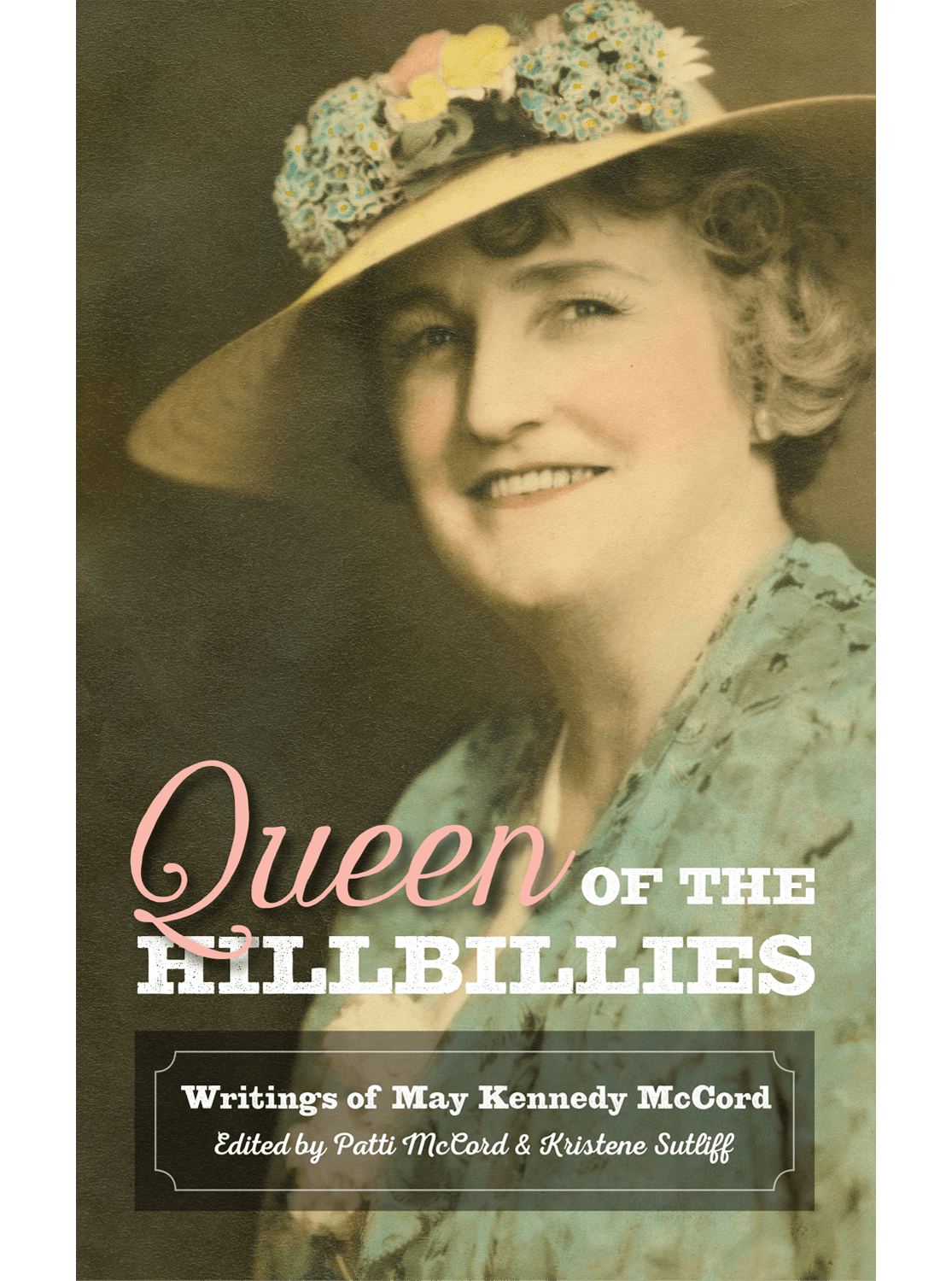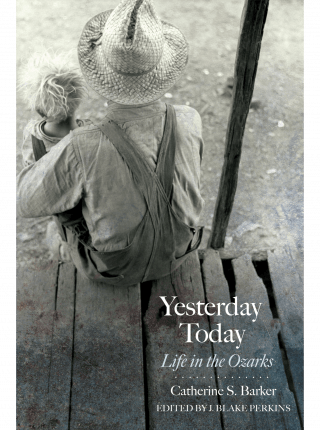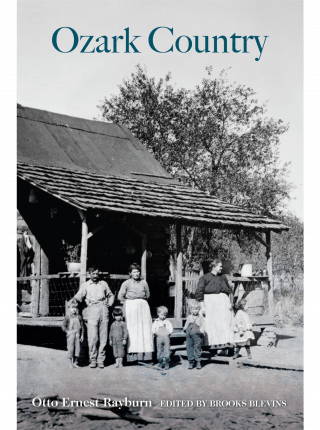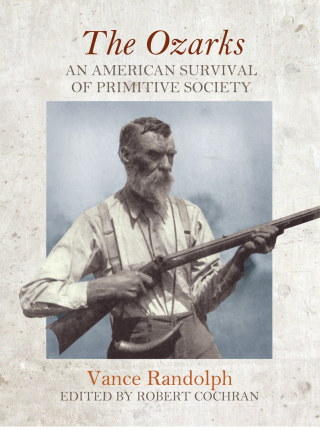May Kennedy McCord, lovingly nicknamed “First Lady of the Ozarks” and “Queen of the Hillbillies,” spent half a century sharing the history, songs, and stories of her native Ozarks through newspaper columns, radio programs, and music festivals. Though her work made her one of the twentieth century’s preeminent folklorists, McCord was first and foremost an entertainer—at one time nearly as renowned as the hills she loved.
Despite the encouragement of her contemporaries, McCord never published a collection of her work. In 1956, Vance Randolph wrote to her, “If you didn’t have such a mental block against writing books, I could show you how to make a book out of extracts from your columns. It would be very little work, and sell like hotcakes. . . . I could write a solemn little introduction, telling the citizens what a fine gal you are! The hell of it is, most of the readers know all about you.” In Queen of the Hillbillies, editors Patti McCord and Kristene Sutliff at last bring together the best of McCord’s published and previously unpublished writings to share her knowledge, humor, and inimitable spirit with a new generation of readers.
Patti McCord is the granddaughter of May Kennedy McCord.
Kristene Sutliff is professor emerita at Missouri State University, where she directed the Ozarks Studies Institute for several years.
Both were born and raised in the Missouri Ozarks.
“The distinctive culture of the Ozarks has been preserved through those who lived it and shared by those who love it. May Kennedy McCord did both of these things: her words, based on pure devotion to the region and its people, not only benefited her contemporaries but will also inspire new readers who can now see the Ozarks through her eyes.”
—Kaitlyn McConnell, founder of Ozarks Alive
Missouri State University Library
Ozarks Room on 3rd Level of Duane G Meyer Library
Thursday, April 28, 2022, 7:00 p.m.
(Facebook Event Page)
Boone County History & Culture Center
Saturday, June 18, 10:30 a.m.
Branson Centennial Museum
120 S Commercial Street in Branson, MO
Tuesday June 21, 12:30 p.m.
Springfield Library Center
Library Center
4653 S Campbell in Springfield.
Thursday September 8, Time TBD
“‘Bless your hearts, here I am again! Bad pennies will bob up, you know,’ Ozarks entertainer and folklorist May Kennedy McCord once joked. McCord has largely faded from public memory, but as historian Brooks Blevins acknowledges, ‘back in the hills and hollers in the middle of the twentieth century no one rivaled her celebrity’. McCord’s granddaughter Patti, together with Missouri State University professor emerita Kristene Sutliff, gathered dozens of McCord’s published and unpublished columns, articles, and radio scripts to produce the first comprehensive collection of her work. … This overdue appraisal of her life and legacy adroitly welcomes ‘the Queen back to the realm.'”
—Missouri Historical Review, October 2022
“Ultimately, this book is a great addition to anyone’s library—you don’t have to be an academic to enjoy McCord’s pearls of wisdom, while scholars will be intrigued by how she rhetorically constructs the Ozarks through an intertextual network. Creative, insightful, and downright sociable, May Kennedy McCord’s writing is a testament to her deep love for and personal connection to her beloved region, and this collection seems to do the Queen justice.”
—OzarksWatch, Fall/Winter 2022-23
“Brooks Blevins—the dean of Ozark studies—and the University of Arkansas Press have offered another generous helping of regional fare with their Chronicles of the Ozarks series. But Queen of the Hillbillies: Writings of May Kennedy McCord, edited by Patti McCord and Kristene Sutliff, represents something new, too. … One of the true pleasures of the volume comes in hearing not only May Kennedy McCord’s distinctive voice but a multiplicity of others. Her columns often include stories, observations, reminiscences, and queries sent in by readers, and many are reproduced here. Blevins notes that, during the mid-twentieth century, McCord was better known in the region than her frequent collaborators Vance Randolph and Otto Ernest Rayburn. But, with them, and through her work with pioneering folklorists like Sarah Gertrude Knott, she enriched the whole nation’s appreciation for for Ozarks culture.”
—Arkansas Historical Quarterly, “Book and Media Notes,” Winter 2021

Chronicles of the Ozarks
In the preface to The Ozarks: An American Survival of Primitive Society, the first nonfiction book on the people of the Ozark region, Vance Randolph confessed that he sought to entertain general readers with stories of a place divorced from the march of time, its inhabitants a people whose isolation and hidebound dedication to the ways of their ancestors rendered them exotic relics in an age of electricity, radios, and automobiles. Randolph knew he was presenting to his audience an incomplete picture of his adopted region, a place more complex and heterogeneous than even he could appreciate. Yet, his decision to essentialize Ozark people and their culture set a precedent that other chroniclers of the Ozarks would dutifully and willingly follow. Whether infused with a romantic fascination for ancient ballads, fox hunters, and weaving grannies or informed by a modernist critique of the intellect-stultifying poverty and backwardness of the benighted hill country, these chronicles all agreed that “the average urban American” who visited the region would feel “himself among an alien people.” The tens of thousands of readers of these books were almost certain to convert generalizations—and generations—into regional stereotypes.





